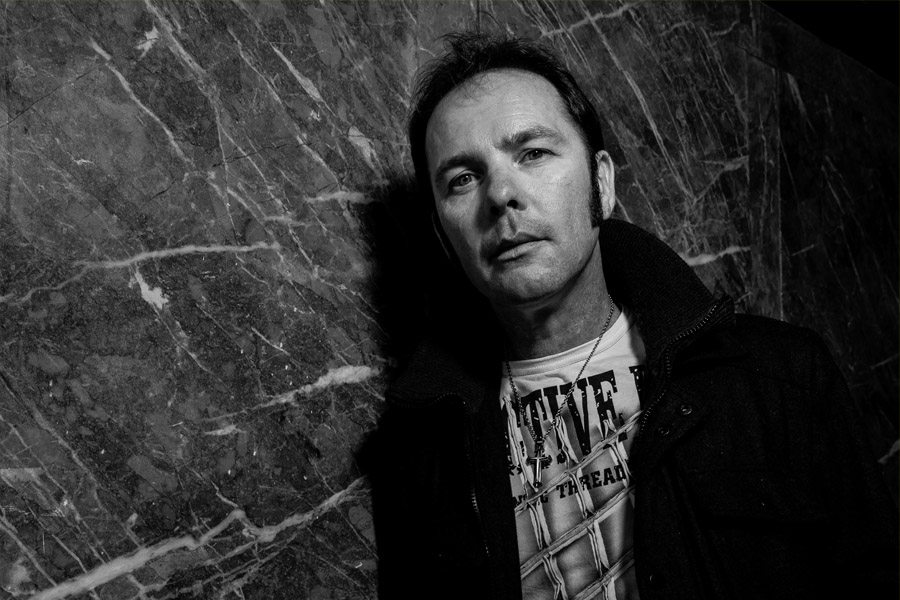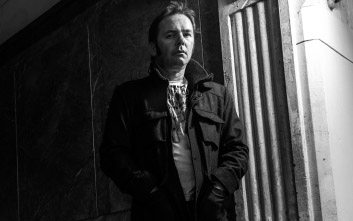It doesn’t get much more real than Ivan Beecroft. An amalgam of punk’s attitude, classic rock’s harmony and dolewave’s political tendencies, his latest album Whatever showcases a vitriolic voice within the Aussie music scene.
Eager to learn a little more about said LP, we asked Beecroft himself to run us through it.

Personal tragedy, vicious attitudes and hardened philosophies: Ivan Beecroft takes us through Whatever one track at a time.
Sleepwalker
Sleepwalker starts the album with a classic AC/DC type intro to put the stamp of Australian rock all over it, the snare crack that follows drives the song steadily into the verse. The lyrical element of the song is unmistakably cynical and deliberately deadpan in its delivery which lights the fuse to the unapologetic subject matter. The lyrics are a response to all the obvious skulduggery that the mainstream media has indulged in over a long period of time. No one could ever accuse Ivan of not having the courage to stand up to the government and corporate bullies that have been instrumental in creating the Orwellian nightmare that we are constantly being forced to endure.
Say It To My Face
Say It To My Face takes aim at the corporate interference in politics by the use of radio talk show hosts to spread political propaganda that benefits major corporations. The music itself has a familiar ring to it; you can hear many influences including Nirvana, Husker Du and Pearl Jam. The lyrics unapologetically target a certain demographic that have become so out touch with reality and have become so indifferent and arrogant in their treatment towards the majority of the working class that they assume that most people don’t mind being equated with cattle. For a track that has very minimal lyric content it manages to cover an extraordinary amount of social and political ills.
You Can’t Take My Soul
The track You Can’t Take My Soul was inspired by the Shawshank Redemption character Andy Dufresne (Tim Robbins). A scene in the film where Dufresne defies Warden Sam Norton (Bob Gunton) by playing opera over the prison’s loudspeakers highlights the deep satisfaction gained by the prisoners from something that spoke to their essential humanity, in spite of the prison regime they were living under. You Can’t Take My Soul reflects that affirmation of humanity under even the most soulless living conditions, typified by the unprecedented amount of inequality that we see in the world today. Even though the lyrics are quite cynical, this track is still a tribute to the resilience of a person’s ability to rise up and overcome dire circumstances in their life.
Got a Reputation
Got a Reputation is a tongue-in-cheek song a bit like Doug Mulray’s I’m a Punk but instead pokes fun at the attitudes that come with being a rebellious teenager. The track has a ’70s punk rock sound to it, the intro has a similarity to Led Zeppelin’s Communication Breakdown. The arrangement of the song is typical of ’70s punk as it has three verses and no chorus, with the main hook line in the first and third verses.
She Said
She Said is about how it’s often easier to get perspective on someone else’s life than your own, and how we judge ourselves far more harshly than we would judge others. The piano rhythm in this track has it bouncing along in joyous abandon, it shows a lighter side to Ivan’s songwriting. She Said has classic Australian rock and pop elements, and ’70s and ’80s influences, while cello in the verses gives a contemporary feel.
Believe
The track Believe is the first single to be released from Ivan’s upcoming album. Following its release in March 2017 it shot up the independent digital radio charts to number 27, and to number 30 on the national rock charts. The song starts with a distinctive drum roll to ease into the intro, before any lyrics are heard the song gives off a definite pop sensibility. The vocals give the song an emotional dimension that makes it difficult to ignore the desperation in the lyrics. Believe is a bittersweet, slightly desperate song about relationships in the context of the difficulties of our times.
How Do You Sleep At Night
How Do You Sleep At Night was written about an incident on Ivan’s street involving a young woman who was dragged into an abandoned house and sexually assaulted. The incident happened at around 10am at a busy intersection and astoundingly no one saw what happened. The verses manage to not go into any graphic detail but still convey the predatory way in which the perpetrator managed to ambush his victim.
Broken Wing
Broken Wing starts with a melancholic and ambient feel to it, from the cymbal swells down to finger-picked guitar the introduction gently glides into the first verse. The simplicity of this song’s lyrics is offset by the complex instrumentation and inspiring use of vocal harmonies throughout. The beauty of this track is in the space that is created. The very subtle use of a ’70s organ give it a rich and vibrant energy that contrasts the lyrics’ mood of melancholy.
Ordinary Man
As the title suggests, Ordinary Man was inspired by Ivan’s working class background. It combines a dystopian mood where you can imagine walking around a crowded street totally invisible to everyone else around, with an anthem for the working class comprising the discomfort of uncertainty and of not being able to find the answer to your own identity or even truly understand the feelings of confusion that haunt you on a daily basis. The musical landscape that this track depicts mirrors the dark, grimy, and at times claustrophobic steel factories that exist in Melbourne. Add the extra element of the daily possibility of losing life and limb to this and it explains a great deal about the honest and unapologetic artist that Ivan has become.
Lost Child
Lost Child is a philosophical meandering that plumbs the depth of how interconnected by technology we have all become – right down to the point where we walk down the street every day and fail to notice anyone else around. It ponders the existential question of where all this will end up – a lot of us can feel like a lost child wandering around in life, not knowing where our place is or if there even is one for us. The bass and cellos set the mood of the track with its adagio tempo and deep winding scale runs that emphasise a feeling of profound sadness.
The Last Goodbye
The Last Goodbye is about the painful experience of the sudden death of Ivan’s father after an aneurism. This song almost didn’t end up on the album for a few reasons: the obvious one being due to the personal nature of it and the feelings and strong emotions it evokes in the author; another being that it might set off a perception that it commercialises the death of a loved one. It was a hard decision to make, but in the end Ivan’s feeling that to not let anyone hear such an honest and well-crafted track would be criminal outweighed the concerns he had.

